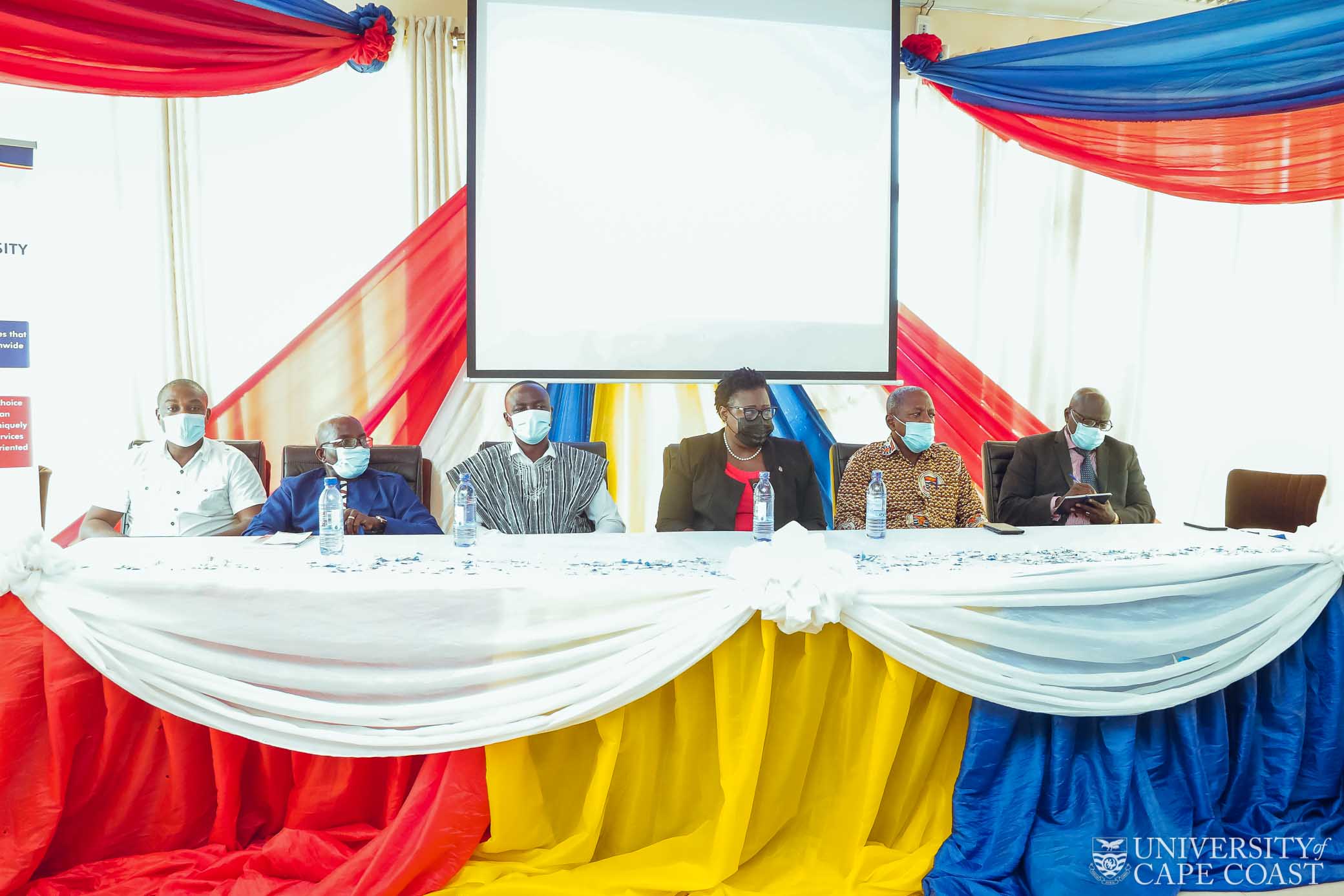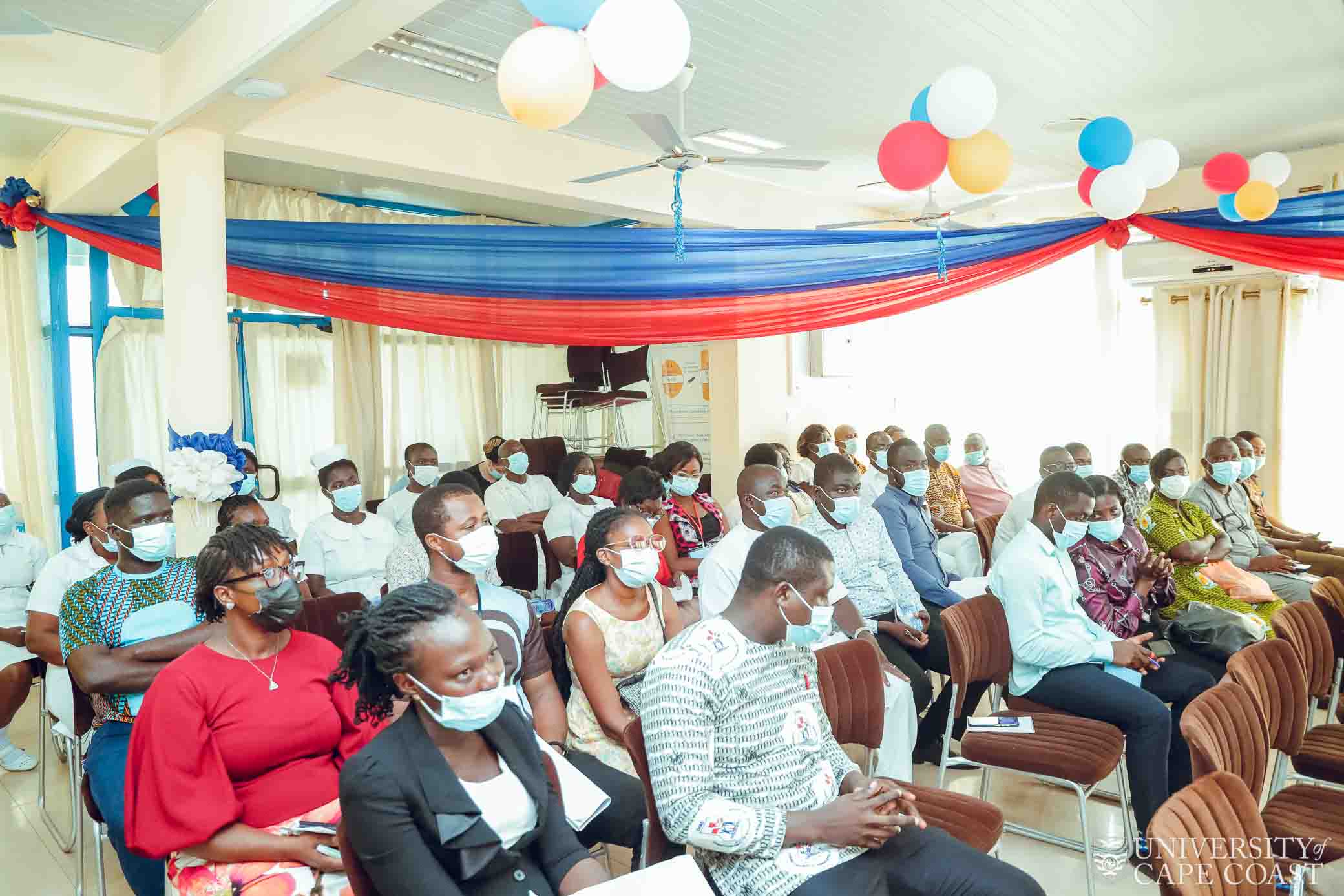CALL FOR APPLICATIONS
The Samuel and Emelia Brew-Butler - SGS/GRASAG, UCC Research Fund is established to provide financial support (grant) to qualified second year postgraduate research students (MPhil/MCom/MN/PhD) to help facilitate and stimulate quality research work. The overriding goal is to motivate students to contribute their quota to national development through quality and timely research. Specifically, the grant is aimed at supporting research students to:
a. Collect research data and complete their thesis on time.
b. Publish their scholarly articles in recognized local and international journals.
c. Attend a research conference
An award of up to GH¢5,000.00 will be given to each successful applicant. The number of awards funded each year will depend on the number and quality of applications received. Qualified applicants shall enjoy the grant once.
Completed applications (hardcopy) for the Research Grant must be received by the School of Graduate Studies on or before 31st January, 2022. Applications will be considered and the outcome made known by 15th April, 2022.
ELIGIBILITY CRITERIA
The research grant is open to all second-year postgraduate research students (MPhil/MCom/MN/PhD) each year who have obtained a CGPA of 2.5 and above.
APPLICATION PROCESS
Applications for the grant may be submitted by second-year postgraduate research students who have successfully defended their research proposal. To access the grant:
1. Application forms can be accessed from the GRASAG, UCC office and SGS, UCC website:https://sgs.ucc.edu.gh/
2. Completed application forms, and other supporting documents (see below), should be submitted to the SGS.
3. Applications should be received by the School of Graduate Studies not later than 4:30pm, 31st January,2022
4. Each application will be reviewed by the Awards Committee. Where necessary, applicants will be invited for interview by the Committee.
I. SUPPORTING DOCUMENTS FOR APPLICANTS WORKING ON THEIR THESIS
1. Research proposal
The research proposal must be submitted in double line spacing and 12-point font size, Times New Roman throughout, on one side only of A4 paper with a margin of at least 2.54 cm on left, right, top, and bottom. The proposal, not including references, must not exceed 5-one sided pages of A4 paper. Applications which do not conform to these rules will not be accepted.
The proposal should have the following parts:
a) Title
b) Abstract (up to 150words)
c) Background/ Introduction (supported with relevant literature)
d) Research questions /hypotheses to be addressed
e) Significance of the study
f) Details of methods to be used (including time-table and budget)
g) Breakdown of the funding requested
h) References (APA Sixth Edition)
2. A letter of support from the applicant’s Principal Supervisor
3. Endorsement of Application by the Applicant’s Head of Department
4. Curriculum vitae of applicant, to include:
a) Family name, forenames and initials
b) Corresponding address, telephone number and e-mail address
c) Date of birth
d) Nationality
e) Academic history: List all educational institutions/universities attended after secondary school - include dates of attendance, field of study, degrees and diplomas with dates awarded and grades if appropriate.
f) Details of any publications (citing full reference details), presentations at conferences/workshops (give name, location and date of conference/workshop, title of presentation, names of authors and whether oral or by poster), and awards (full details, including both undergraduate and postgraduate awards).
5. Academic transcript (postgraduate level)
II. SUPPORTING DOCUMENTS FOR APPLICANTS PRESENTING A FULL RESEARCH PAPER FOR CONFERENCE(S)/ PUBLICATION
The Samuel and Emelia Brew-Butler - SGS/GRASAG, UCC Research Fund besides its establishment to financially support qualified second year postgraduate research students (MPhil/MCom/MN/PhD), has now extended support to providing financial assistance to research students participating in either a local or an international conference.
1. Research Paper
The research paper must be submitted in double line spacing and 12-point font size, Times New Roman throughout, on one side only of A4 paper with a margin of at least 2.54 cm on left, right, top, and bottom. The research paper, not including references, must be between 10-15 one sided pages of A4 paper. Applications which do not conform to these rules will not be accepted.
The research paper should have the following parts:
a) Title
b) Abstract (up to 150 words)
c) Background/Introduction (supported with relevant literature)
d) Research questions /hypotheses to be addressed
e) Significance of the study
f) Details of methods used
g) Findings
h) Recommendations
i) Breakdown of the funding requested
j) References (APA Sixth Edition)
2. Presentation (Chat or Banner) (for only presenters at a conference)
3. Letter of justification approved by the student’s Head of Department in consultation with the student’s supervisor(s).
4. Curriculum vitae of applicant, to include:
a) Family name, forenames and initials
b) Corresponding address, telephone and e-mail
c) Date of birth
d) Nationality
e) Academic history: List all educational institutions/universities attended after secondary school - include dates of attendance, field of study, degrees and diplomas with dates awarded and grades if appropriate.
f) Details of any publications (citing full reference details), presentations at conferences/workshops (give name, location and date of conference/workshop, title of presentation, names of authors and whether oral or by poster), and awards (full details, including both undergraduate and postgraduate awards).
5. Academic transcript (postgraduate level).
6. Provide details of other sources of funds
7. a) For Conference
i. Must be a presenter (Evidence of acceptance of research documents to be presented at the conference)
ii. Evidence of participation invitation letter
iii. Theme of the Conference
iv. Country and Venue
v. Date of Conference
vi. Topic (this should be related to the thesis you submitted to the University of Cape Coast)
vii. Scheduled presentation to Award Committee Members and some selected official from your department.
b) For Publication
The Journal for publication should be a good Journal with Google Scholar citation, Science Index, SCOPUS, and others.
AREAS OF SUPPORT (for conference applicants only)
Qualified applicants would be supported in any of these areas per decision by the Awards Committee:
Local Conference
1. Transportation
2. Accommodation
3. Conference fee
International Conference
1. Air Ticket
2. Visa fee
3. Conference fee
4. Accommodation
REPORTS
A progress report or completion of conference presentation must be prepared by all recipients of the grant and submitted to the SGS. Master’s candidates, must submit their progress report every three months after receipt of the award. For PHD candidates, the report must be submitted every six months after receipt of the award. Applicants who were presenters at a conference must submit a report of the outcome of their presentation 2 weeks after their completion of presentation. Publication of Journal applicants must submit a progress report after 1year of receipt of the award. The report should indicate results accomplished problems and modifications made to the original research proposal and any completed or forth coming presentations and publications from the research. Applicants would also be required to submit their Grant Utilisation report. In this report, it is required that recipients spell out how they have utilised the fund as specified in a form to be collected from the Account Office of the School of Graduate Studies. The report will be reviewed by the SGS Awards Committee. Where a beneficiary fails to provide a progress report, he/she will not be eligible for any other award from the School and may be required to refund the amount. His/her supervisors will not be eligible to support other applicants. Awardees are encouraged to present their final report at Conferences organized by School of Graduate Studies, and any other conferences.
NOTE
Awardees are also required to acknowledge the support received from the Fund in their final thesis and any other publications they may produce from the thesis.
Interested Applicants should CLICK BELOW FOR APPLICATION FORM
samuel_and_emelia_brew-butler_-_sgs_grasag_research_grant_2021-2022.pdf






